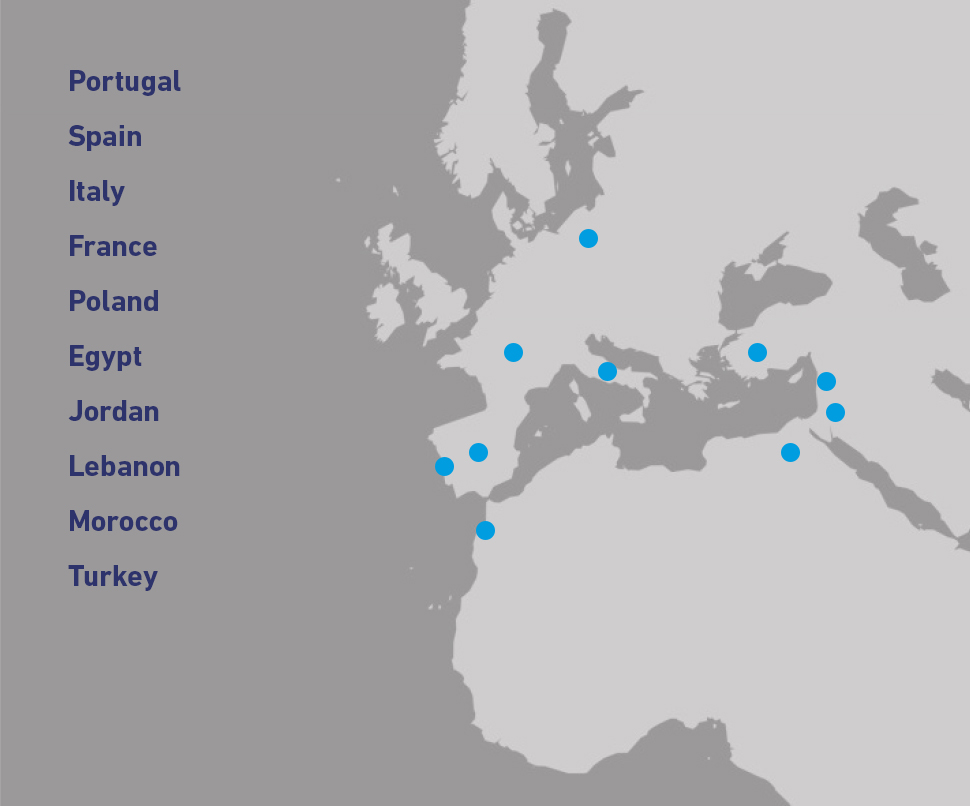
Euromed-RRM – Implementing a Rapid Response Mechanism for Higher Education in Emergencies in the Euro-Med region
Context and objectives
Euromed-RRM aims at running an emergency scholarship programme to test the feasibility of a systemic, full-scale academic response to needs of young people caught in humanitarian crises or in forced mobility due to conflicts and natural disasters.
After almost 10 years of civil war, the UNHCR data shows that Syria has displaced more than 11.2 million people within and outside the country. Before the war, Syria’s higher education was thriving with almost 25% of students getting their baccalaureate having access to higher education. Yet according to available data, the impact of the conflict on the education sector and training systems in Syria is huge. Though the Syrian refugee crisis is the largest displacement crisis of our time, there are other ongoing crises at the global stage that affect the region. Euromed-RRM aims at achieving the following objectives:
- Running a scholarship programme that will enable young people caught in humanitarian crises such as refugees and students from the host communities to get a job – the programme will adopt a holistic approach providing academic opportunities, but also non-academic support such as mentoring, soft skills training and career development, significant empowerment opportunities for girls and young women increasing their potential to engage as change-makers, and a focus on studies that match the needs of the new digital era, thus providing students with skills the job market is looking for.
- Setting up a fully operational Rapid Response Mechanism allowing the international community to develop a fast-track entry point that addresses higher education needs in times of crisis and emergency situations.
Location

Key figures
Duration:
2021-2024
Countries:
10
Total cost:
€ 7.5 M
Promoter
The Global Platform for Higher Education in Emergencies was founded by Jorge Sampaio, former President of Portugal, with the support of a core group of institutional partners, namely the Council of Europe, the League of Arab States, and the International Organization of Migrations; it brings together the efforts of various stakeholders such as philanthropies and the private sector willing to back an emergency mechanism to support refugee students.
Key partners
A Network of Partners made up of a wide range of members – international organizations, governments, aid agencies, foundations, NGOs, the private sector, and individuals – engaged in supporting the higher education sector in conflict settings.
An Academic Consortium made up of more than 45 universities and other higher education institutions and providers committed to providing refugees and students in forced mobility with opportunities to pursue their education.
An Emergency Fund made up of voluntary donations and grants made to the Global Platform, but also of the outcomes of fund-raising campaigns.
Beneficiaries
- 200 refugee students (mainly Syrian but not exclusively) and 100 students from the host communities (50% women)
- 1500 members of the students’ families
- Hundreds of thousands, as RRM contributes to the UNHCR goal of increasing to 15% the number of refugee students by 2030.
Key actions
Emergency Scholarship Programme
Calls for Applications; selection of candidates; signature of agreements with students, HEIs, and local partners;
Summer programmes – soft skills’ trainings and internships.
Rapid Response Mechanism (RRM)
Further upgrade of the RRM – not only in terms of digital features and back-office functionalities, but also in terms of information available on lessons learned and best practices collected as well as services offered to partners, HEIs and students.
Coordination Mechanism activities and Expert Group meetings.
Development of the Financing Facility.
Annual Conferences.
Expected results
300 students will graduate, thus getting access to qualified jobs; previously, they will have been mentored by Alumni Buddy Programmes, attended soft skills training courses and participated in internships;
15 people will be hired for various tasks related to the project in 10 countries;
The Academic Consortium will be enlarged, the Financing Facility further developed, and the Coordination Mechanism improved;
Best practices and procedures will be collected, improved, and disseminated during the Annual Conferences.
